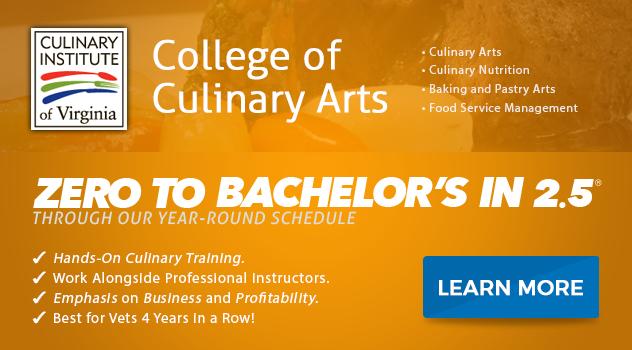 You don’t have to watch Hell’s Kitchen or The Rachael Ray Show to know that the public is fascinated by food. Ever since the 1960s when Julia Child invited the world to watch her cook, celebrity chefs with unique, sometimes controversial personalities, have graced the airways, making the kitchen a stage.
You don’t have to watch Hell’s Kitchen or The Rachael Ray Show to know that the public is fascinated by food. Ever since the 1960s when Julia Child invited the world to watch her cook, celebrity chefs with unique, sometimes controversial personalities, have graced the airways, making the kitchen a stage.
People love to eat, and those that can make food not only enticing but also fun are a special breed of entertainment.
Nutrition: the New Focus
Celebrity chefs aside, nowadays it takes more than just attention to food artistry and flamboyant personalities to become a successful culinary professional. Restaurant patrons have become increasingly nutrition conscious. It’s not enough that that a dish looks pretty with colorful garnishes, or even that it tastes spectacular. As more people become aware that nutritious eating promotes longer life, better health, and improved energy, the focus has shifted from taste and appearance to a more healthful approach. Today’s consumer is looking not only for delicious food, but food with premium nutritional value.
One food expert spoke about the future outlook for restaurant and food trends in 2015:
“[It’s] only natural that culinary themes like local sourcing, sustainability and nutrition top our list of menu trends . . . . Those concepts are wider lifestyle choices for many Americans in other aspects of their lives that also translate into the food space.”
—Hudson Riehle, Senior Vice President of the National Restaurant Association’s Research and Knowledge Group
This shift is further supported by a 2013 study by the International Food Information Council Foundation, which concluded that Millennials are making an effort to eat more nutritiously despite financial barriers and lack of convenience. Since the Millennials are the restaurant patrons and food-buyers of the future, this trend is likely to continue.
Higher Nutritional Standards Everywhere
No venue seems exempt from this new level of expectation, including school cafeterias, hospitals, and retirement communities. Gone are the days of “mystery meat” and vegetables with questionable coloring. Consumers are demanding and expecting quality food wherever they eat. For this reason, facilities responsible for serving large numbers of people are raising their standards.
The effect of this shift is significant, as these institutions—previously uncharted territory in high-level culinary circles—are ripe for new faces and new talent in the kitchen. Those with a degree in culinary nutrition may well find themselves at a competitive advantage when the “Now Hiring” sign is hung out front. They can position themselves as professionals with special knowledge of dietary management highly valued by the healthy hospitality industry.
Career Choices in Culinary Nutrition
With an Associate of Applied Science Degree in Culinary Arts and Applied Nutrition, your career choices can go beyond the local diner or even the hottest eatery in town. With this versatile educational background, your options include work as a personal chef as well as employment in resorts and spas, hotels, catering and event services, schools, universities, and healthcare facilities.
Culinary Nutrition Curriculum
Your course of study in culinary nutrition will blend classic cooking techniques with the science of nutrition in a program designed to help you meet the expectations of health-conscious consumers. The program is composed of three separate modules:
- Foundational courses in culinary skills and techniques will cover things like kitchen organization and cooking methods; procedures for meat, seafood, poultry, and baking; and plating and aesthetic presentation techniques.
- The nutrition and dietary management portion will include nutritional analysis, menu planning, ingredient sourcing and integrity, dietary conditions and therapies, and alternative cooking techniques.
- You can also study management principles for creating a safe and efficient culinary operation. Courses cover subjects such as storeroom management, kitchen safety, and sanitation procedures.
Studying culinary nutrition involves more than just classroom-based learning. Through the use of real-world externships, you can gain practical knowledge by applying the skills you’ve learned in class.
With the knowledge and experience you can gained in this program, you can be more than just a professional chef, but rather a multi-faceted culinary professional.
Are you interested in the possibilities that await you in the field of culinary nutrition?
Contact ECPI University’s College of Culinary Arts, Culinary Institute of Virginia, and find out how you can earn an Associate of Applied Science Degree in Culinary Arts and Applied Nutrition in less than 15 months through its year-round program. It could be the Best Decision You Ever Make!
DISCLAIMER – ECPI University makes no claim, warranty or guarantee as to actual employability or earning potential to current, past or future students or graduates of any educational program we offer. The ECPI University website is published for informational purposes only. Every effort is made to ensure the accuracy of information contained on the ECPI.edu domain; however, no warranty of accuracy is made. No contractual rights, either expressed or implied, are created by its content.
For more information about ECPI University or any of our programs click here: http://www.ecpi.edu/ or http://ow.ly/Ca1ya.



